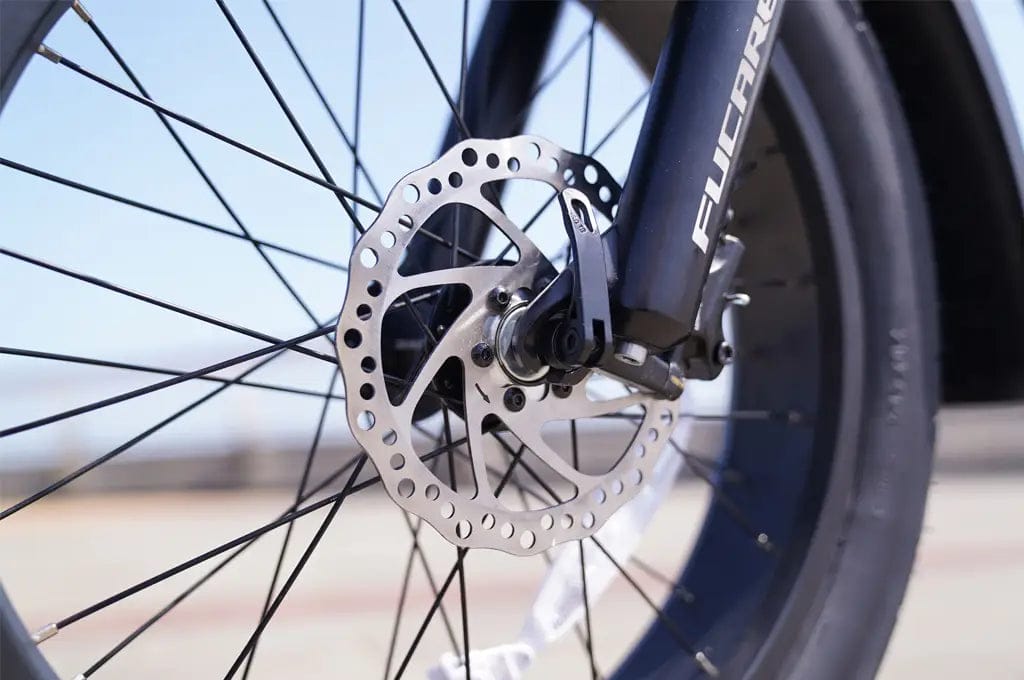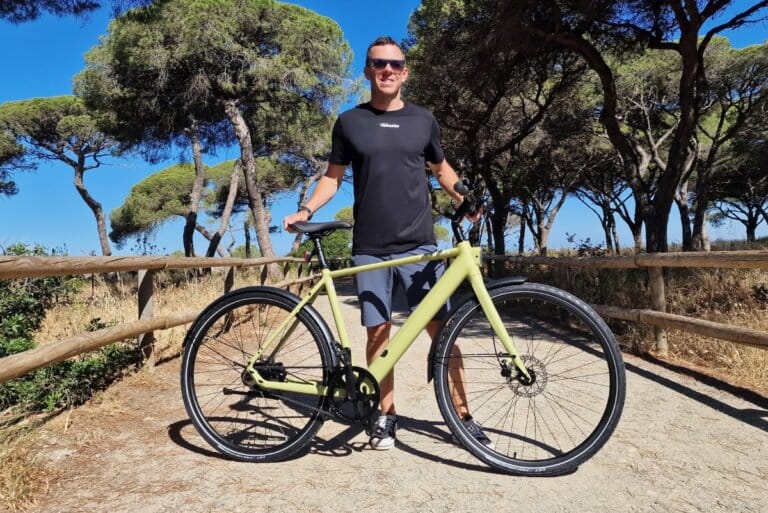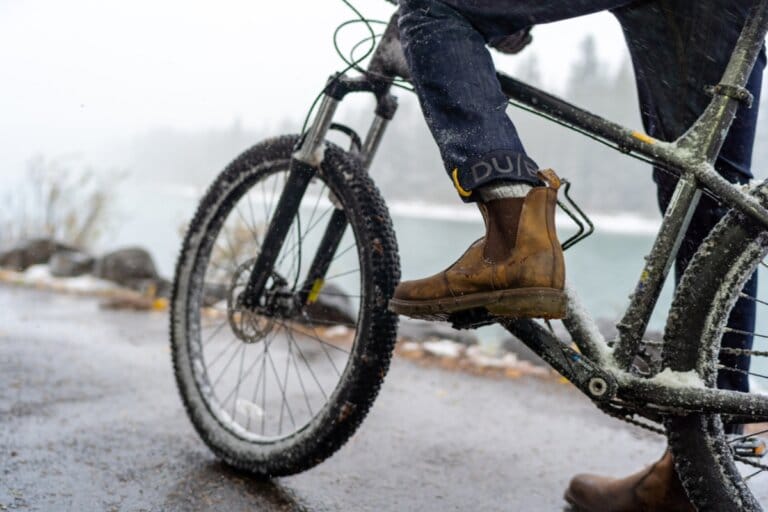Why is my disc-roar brake and how to fix it?
Breaking disc brakes are often caused by dirt, oil or moisture on the rotors. There may also be deformed rotors or glazed brake pads. To fix this, clean the rotor isopropyl alcohol, check the damage and provide proper alignment of the caliper and pads.
In this article we will study the reasons for peak disk brake and offer effective solutions to get rid of noise forever.
Why the disc brakes on Bike Bike Ski?
The disc brakes on electronic guidance, as well as on ordinary bicycles or even cars, rests on friction between brake pads and rotors to stop your bike. Breaking sound is usually caused by vibration during braking, often increased under certain conditions such as pollution or uneven components. Although not always dangerous, noise can be a sign that something doesn’t work as optimally as it should be.
Below are the most common reasons why your disc brakes can be squeezed:
1. The contaminated brake pads or rotor

One of the most common causes of squeaky disc brakes is contamination. Your brake pads or rotor can easily pollute with oil, dirt or even water. In particular, electronic bikes may be more prone to pollution as they are often used in the weather. The pollution can occur from lubricants used elsewhere on a bicycle like a chain that can accidentally spill into brake components. Once the brake pads or rotor contaminated, the trend decreases and substrate can create squeak noise.
The decision is:
To fix the pollution, brake pads and rotors need careful cleaning. Start by using isopropyl alcohol or specialized disk cleaner, which you can find in most bicycle stores. Apply the cleaner to a clean rag and wipe the rotor thoroughly. Rotor cleaning can remove surface pollution, but if the pads are soaked in oil or other lubricants, they will need to be replaced.
2. Incorrect bedding in
Brakes in brake pads is a decisive step that often ignores electronic bicycle owners, especially if you buy a new electric bike or replace brake pads and rotors. Bed linen refers to the process of uniform material transfer from the pad to the rotor to create a smooth brake surface. Without proper linen, the pillow material can transfer uneven to the rotor, creating a glass surface that squeaks and reduces the inhibition performance.
If you miss this important step after receiving new brake components, you run the risk of laying glass, which not only reduces the brake power, but also increases the likelihood of noise and vibration. Thus, it is strongly recommended to sleep in the brakes at any time when you install new pads or rotor.
The decision is:
In the bed in the brake pads, follow the following simple steps:
- Find a flat surface and ride an electronic bike at a moderate speed.
- Carefully apply the brake until you slow down to walking speed.
- Release the brake, let the bike restore the speed and repeat the process 20 times for each brake.
This will help to evenly distribute the material and reduce the risk of squealing caused by improper linen, providing smoother and more efficient brake performance.
3. Demolished brake pads

If your brake pads wore all your friction material, the metal substrate can press directly on the rotor. Not only does it create a loud scream, it also damages the rotor. It is important to check the thickness of your brake pads regularly and replace them before they are completely worn.
The decision is:
Check the brake pads regularly and replace them if the material is too thin. To replace them, you will need to remove the caliper and pop up old pads. Most of the brake pad sets are shipped with the instructions for proper installation. After installing, remember to sleep in new overlays to ensure optimal performance.
4. Wet brakes
If your brakes are wet, whether from the rain or after washing the bike, they can temporarily squeak. Water can reduce the friction between the brake pads and the rotor, causing high noise. This type of peak usually disappears as soon as the brakes dry, but it is important to monitor whether the noise continues after they have dried.
The decision is:
Allow the brakes to dry naturally and the squeak should subside. If they continue to write after drying, pollution or other major problem may occur.
5. The dirty rotor
Over time, dirt and dirt can increase rotor, which will reduce brake characteristics and noise. A dirty rotor may not provide a smooth surface for the brake columns, which can lead to vibrations and screams.
The decision is:
To clean the rotor, use isopropyl alcohol or non -toxic brake brake cleaners. Just apply the cleaner to the clean fabric and carefully wipe the rotor, paying attention to both sides. Be careful not to touch the rotor with thick or greasy hands.
6. School pads or rotor
When your brake pads are glazed, they develop a shiny surface that reduces their efficiency. Fuel can happen when the pads were overheated, for example, during a long descent or an intensive brake session. Pillows or rotor can have a smooth, polished species, and it can lead to squeak.
The decision is:
Grinding of the pad is one way to remove the glass surface. Use 100-120 sand and slightly scatter the pads until you see a fresh, glazed surface. In addition, gently scatter the rotor diagonally to remove any smooth groove. Always clean the rotor, and pads after grinding to remove dust or rest before reinstalling them.
7. Incorrect brake pads or rotor
If the brake pads are not aligned properly in the caliper, they can communicate with the rotor unevenly, causing noise. The distortion may occur after the accident, improper installation or gradual wear.
The decision is:
Make sure the brake pads and the caliper are properly aligned with the rotor. Many modern electronic bikes have regulated calves so you can configure a position to ensure equal contact. Lightly loosen the caliper bolts, squeeze the brake lever to focus the pads on the rotor, and then twist the bolts, keeping the lever.
Conclusion
Breaking disc brakes for electron bike can become unpleasant, but fortunately most of the noise causes are easily corrected. Be it pollution, worn pads, improper linen or dirty rotors, each problem has a certain solution that can restore your brakes in their calm and effective work. Regular maintenance is key to prevent these problems in the first place. Keep the rotor clean, often check the gaskets and make sure you sleep in new pads. By doing this, you can enjoy a smooth, quiet and safe trip on your electronic bike without irritation of squeak brakes.







